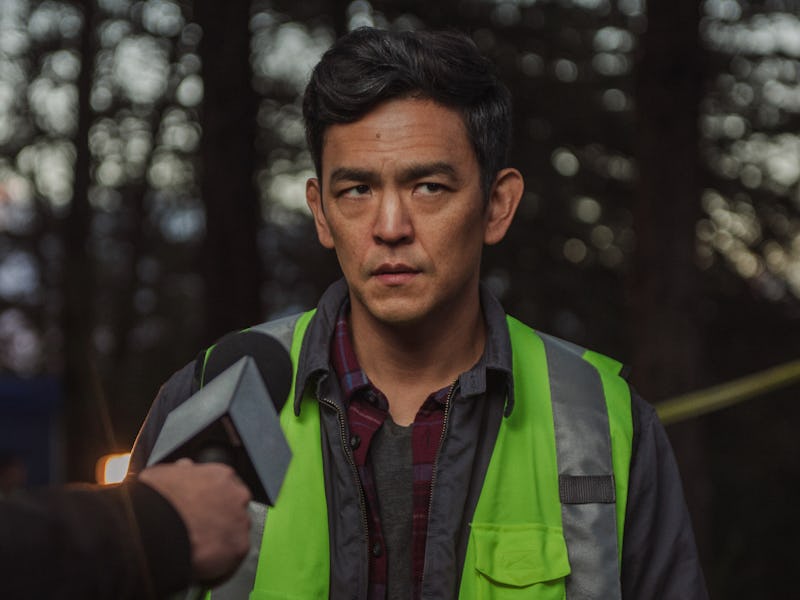The Real Horror of 'Searching' Is Far More Ancient Than Technology
The directorial debut from Aneesh Chaganty is more than just its unique webcam framing device.

It would be an oversimplification to describe Searching as a horror movie about technology. The true terror of first-time director Aneesh Chaganty’s thriller is actually something far more ancient than iMessage: It’s a story about what happens when people fail to communicate.
In Searching, John Cho plays David Kim, a widowed father to teenaged Margot (Michelle La), who goes missing after exhibiting suspiciously uncharacteristic behavior. The search for Margot is led by hard-boiled detective Rosemary Vick (Debra Messing) while David follows his daughter’s digital footprints, only to confront every parent’s nightmare.
Befitting the story, Searching utilizes a unique but not unheard of framing device that fits the big picture theme. In place of traditional cinematography, Searching is told entirely through web videos, web cams, security footage, FaceTime, and livestreams. If there’s a device with a camera, Searching uses it; the oldest medium the story ever enters through are local news broadcasts. And, surprisingly, it totally works.
The legacy of 1998’s The Blair Witch Project is a lot bigger most are willing to give it credit for. Arriving a short three years before ground-level footage of 9/11 seared itself into our memory banks, and years before YouTube, Blair Witch gave audiences a new way to see movies, however nauseating. It’s been 17 years since that film, and in that time the found footage genre has barely learned anything new. (Not even 2016’s Blair Witch!)
Enter Searching, the true evolution of the found footage horror subgenre. Even without traditional cinematography to work with, Chaganty still manages to use close-ups, zooms, and other old techniques to tell his story. Searching looks different, but it’s not at all a gimmick.
'Searching' looks like this a lot, but don't be afraid. A computer screen has never been more gripping.
Also not a gimmick: The film’s uniquely Asian-American casting. There’s a groundswell of support for Searching because of its cast, who participate in a story that may resonate more with the Asian diaspora. On the surface, Searching is a universal story about missing loved ones in the age of smart technology, but it also explores far deeper themes of immigrant personal identity. Through Margot, Asian-Americans are likely to feel the weight of crushing model minority stereotypes experienced by second and third-generation children of immigrants. In this film, it actually matters when Margot grows bored of her piano lessons.
Margot, whom La plays with purposeful detachment, is a model student — a kid any parent can be proud of, at least in the eyes of her father. But with the absence of her loving mother and the difficulties of growing up, Margot has stashed away some dark secrets. Again, this is familiar to anyone who was ever a teenager, but the film’s release on the heels of Crazy Rich Asians and Netflix’s To All the Boys I’ve Loved Before underscores its obvious but unspoken Asian-American elements.
The real communication problem in Searching is that David doesn’t understand his daughter. No parent truly does, but his arrogance — at least partially a result of his family’s Korean heritage — is the biggest elephant in the room.
“I know my daughter!” Cho’s David yells, several times throughout the movie, often to stoic faces who’ve heard that one before. David is overwhelmed and embarrassed as the world watches his misery from their screens.
The recent Pixar short Bao explored a different side to this dynamic of Asian immigrant families. In that film, a mother’s love for her sentient baby dumpling is so suffocating that she’d rather eat him than lose him to the outside world. Though with far less explicit cues, Searching too explores the underlying stakes of families needing to stay together, an idea woven into the DNA of collectivistic Asian culture even to those who’ve emigrated abroad. Searching amplifies this pressure for the Kims, and their failures are presented for all the world to see at 4G speeds.
Searching isn’t a horror movie in the strictest sense. There are no ghosts or headless children or demon houses. This isn’t Hereditary. But the ease of which we can lose the people we love, even when we now willingly buy trackable computers we carry everywhere is absolutely frightening. All this could be avoided if we just talked to each other.
Searching hits theaters on August 31.